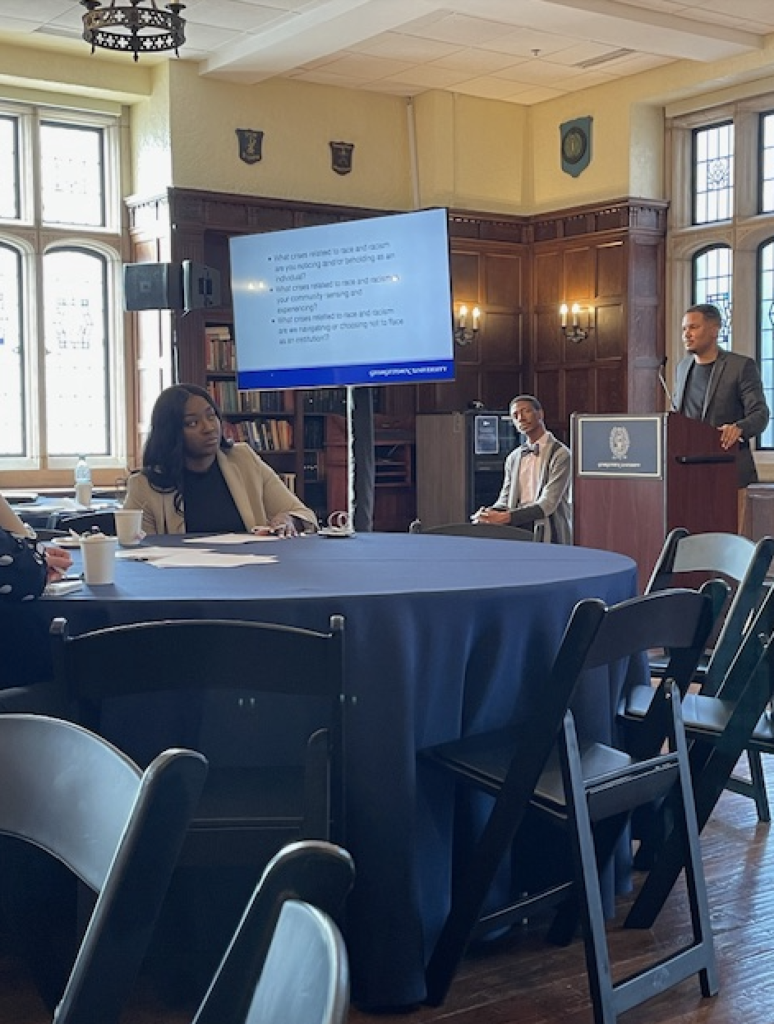This week I was invited to present at the second annual Staff/AAP Symposium organized by the Staff and Academic and Administrative Professionals Advisory Council. The theme of the day’s programming, which includes presentations, peer mentoring, fellowship, and breakout sessions about different topics, was “Thriving at Georgetown.” I gave a short presentation titled, Putting Mission in Motion: Ignatian Resources for Exercising Leadership Every Day. Given my recent work with SCS professional certificate programs like the Master Practitioner in Leadership and the Certificate in Strategic Thinking & Leadership, I have been thinking a lot about the most effective ways to integrate Jesuit mission and Ignatian heritage into leadership development.
In this post, I want to offer three Ignatian practices originating from the Spiritual Exercises of St. Ignatius that can be broadly translated to a large and diverse audience. My hope is to spark some deeper connection between the tradition and resources of Ignatian heritage and Jesuit mission and the inner, self-development that we are invited to as members of the Georgetown community. Ultimately, I believe that creating a bridge between Ignatian spirituality and contemporary leadership theory and application exemplifies our Spirit of Georgetown commitment to the value of “Contemplation in Action.” Growing in leadership for the tasks we are called to each day and doing so in a way that is generous and life-giving requires that we grow more and more rooted in our self-understanding and self-awareness. Generous “doing” flows from generous “being.”
The first practice is to make a daily self-inventory and awareness. The Ignatian term for this is a daily Examen of Consciousness. The Examen, described many times on this blog, is a spiritual method of growing in self-awareness by noticing, with God’s eyes, how one’s daily feelings, thoughts, and actions align with one’s True Self. Utilizing a full sensory experience, one’s Examen is a form of healthy self-inventory in which the person, in an atmosphere of trust and safety in relationship to God, notices the convergences as well as the divergences from one’s True Self. In non-religious terms, one might think of this step as an honest self-evaluation or reflective review of one’s flourishing as well as one’s faults. Authentic leaders are not afraid to regularly engage in this kind of deeper self-awareness because they recognize that sensing the needs of others, including the dynamics in a group, depend on first being aware of what is happening in themselves.
The second practice is to discern daily choices with intention. The Ignatian terms for this are Discernment of Spirits that can lead to an Election, or choice. The premise here is that making decisions that ultimately serve our ultimate purpose both as individuals and organizations requires intentional consideration of multiple kinds of data that we collect on a regular basis. In particular, an authentic leader is paying attention to the inner movements of thoughts, feelings, imaginings, etc. in order to track how different possibilities correspond to different inner movements. The discerning leader attempts to follow the sequence of these movements in a way that the direction of the potential choice is most in service of mission and the greater good. Habituating discernment in this style requires daily practice and regular support of a spiritual guide, coach, or mentor.
The third practice is to savor your “flow” experiences. The Ignatian term for this is Consolation. For Ignatius, Discernment of Spirits leads a person to notice two kinds of contrary states: Consolation and Desolation. The former is a state of feeling or thought in which our inner movement in response to human experience both brings joy and inclines us to act in ways that bring us closer to God and our deeper purpose. Consolation in this sense is more than just a positive feeling, but a movement that directs us toward loving actions. Desolation is the contrary situation in which one’s reaction to life’s events leads one to doubt or despair and can cause one to question one’s purpose or de-commit from realizing mission.
Obviously, a human life includes both kinds of experiences and Ignatius counsels us to store up our Consolations for when we will inevitably fall into periods of Desolation. The modern school of “Positive Psychology” has picked up on consolation with the term, “flow.” In this theory, one should pay attention to regular experiences of flow marked by intense concentration, effortlessness yet full engagement, and a loss of anxiety or pre-occupation. The Jesuit Nicholas Austin takes up this connection in more detail in the article, “Towards an Ignatian Spirituality of Study.”
Growing as leaders, especially in difficult times like these, requires support and I would offer up these Ignatian practices as resources for your journeys ahead.

